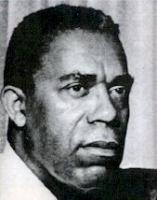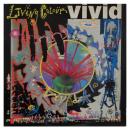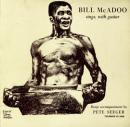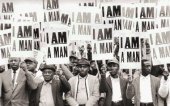Musing on roses and revolutions,
I saw night close down on the earth like a great dark wing,
and the lighted cities were like tapers in the night,
and I heard the lamentations of a million hearts
regretting life and crying for the grave,
and I saw the Negro lying in the swamp with his face blown off,
and the northern cities with his manhood maligned and felt the writhing
of his viscera like that of a hare hunted down or the bear at bay,
and I saw men working and taking joy in their work
and embracing the hard eyed whore with joyless excitement
and lying with wives and virgins in impotence
And as I groped in darkness
and felt the pain of million,
gradually, like day driving night across the continent,
I saw dawn upon them like the sun a vision
of a time when all men walk proudly through the earth
and the bombs and missiles lie at the bottom of the ocean
like the bones of dinosaurs buried under the shale of eras,
and men strive with each other not for power or the accumulation of paper
but in joy create for others the house, the poem, the game of athletic beauty.
Then washed in the brightness of this vision,
I saw how in its radiance would grow and be nourished and suddenly
burst into terrible and splendid bloom
the blood-red flower of revolution...
I saw night close down on the earth like a great dark wing,
and the lighted cities were like tapers in the night,
and I heard the lamentations of a million hearts
regretting life and crying for the grave,
and I saw the Negro lying in the swamp with his face blown off,
and the northern cities with his manhood maligned and felt the writhing
of his viscera like that of a hare hunted down or the bear at bay,
and I saw men working and taking joy in their work
and embracing the hard eyed whore with joyless excitement
and lying with wives and virgins in impotence
And as I groped in darkness
and felt the pain of million,
gradually, like day driving night across the continent,
I saw dawn upon them like the sun a vision
of a time when all men walk proudly through the earth
and the bombs and missiles lie at the bottom of the ocean
like the bones of dinosaurs buried under the shale of eras,
and men strive with each other not for power or the accumulation of paper
but in joy create for others the house, the poem, the game of athletic beauty.
Then washed in the brightness of this vision,
I saw how in its radiance would grow and be nourished and suddenly
burst into terrible and splendid bloom
the blood-red flower of revolution...
envoyé par Bernart Bartleby - 24/3/2015 - 10:39
×
![]()







Versi di Dudley Randall (1914–2000), poeta ed editore afroamericano, nella sua raccolta poetica intitolata “Cities Burning”, pubblicata nel 1968.
Musica di Hans Werner Henze (1926-2012), importante compositore tedesco, in “Voices – Stimmen”, raccolta di canzoni per mezzo soprano, tenore, elettroniche, campionamenti e 15 musicisti impegnati a suonare una settantina di strumenti diversi, pubblicata nella RDT nel 1973
Alla base della composizione c'erano 22 brani indipendenti, le "voci" di diversi autori, "giovani e vecchi artisti che rifettono sul genere umano, sulla condizione dell'uomo contemporaneo e sui problemi di razza e di classe in cui loro stessi si sono imbattuti nel corso dell'esistenza".
Poeta precocissimo, Dudley Randall lavorò come operaio alla Ford e come impiegato delle poste, e combattè nella Seconda guerra mondiale. Poi si laureò con un master in scienza bibliotecaria e lavorò come dirigente del sistema bibliotecario dell’Università di Detroit. Nel 1965 Dudley Randall fondò una propria rivista, la Broadside Press, con l’obiettivo di pubblicare le cose migliori dei nuovi autori afroamericani. Sul primo numero della nuova rivista letteraria Dudley Randall pubblicò anche la sua poesia più famosa, The Ballad of Birmingham, dedicata alle quattro giovanissime vittime, tutte ragazzine nere, dell’attentato terroristico realizzato dal KKK il 15 settembre 1963 a Birmingham, Alabama. Due dei responsabili, Thomas Blanton e Bobby Cherry, furono condannati all’ergastolo ma soltanto nel 2000, 37 anni dopo i fatti.